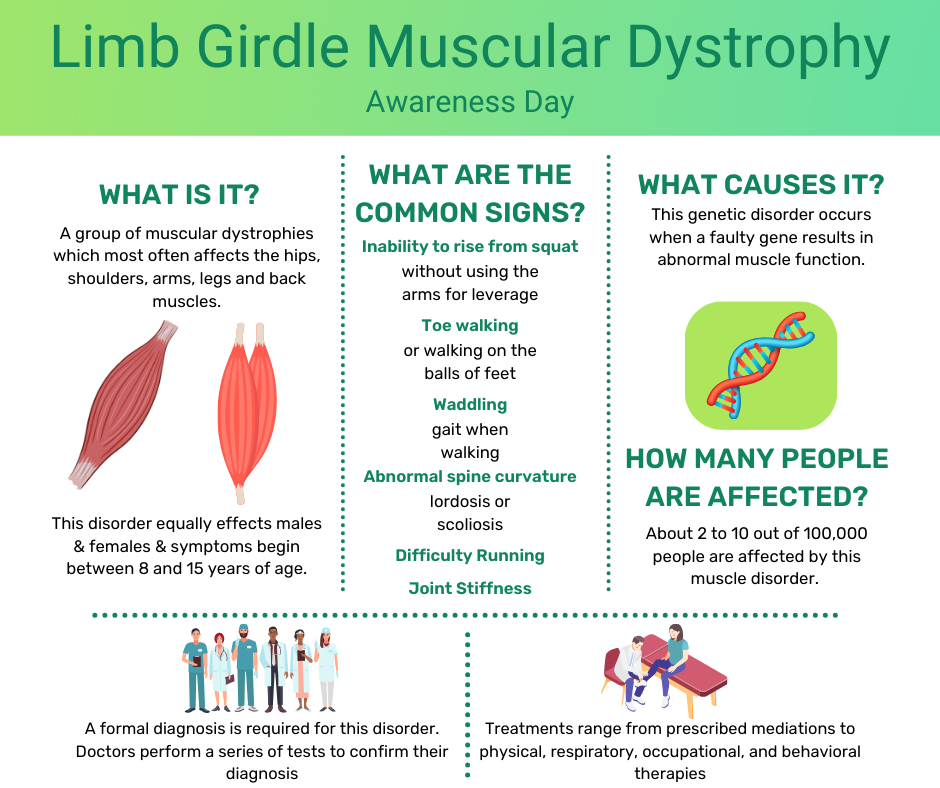Children
Kolton Conquers Sensory Struggles and Graduates Occupational Therapy Victorious
December 18, 2023At three years old, Kolton was having difficulty within a variety of areas including attention, transitions, emotional regulation, sensory processing, using feeding utensils, and pencil grip. His mom Sam, a behavioral consultant who had a professional history with the Schreiber Center for Pediatric Development, brought him to the center for assessment. “I wanted to be sure that if there was something more we could be doing to help him struggle less, we were doing it.” Sam shares.
During his assessment, it was discovered that Kolton’s visual motor skills were in the average range. However, his fine motor skills were below average impacting his pencil and feeding utensils grasp. He was also demonstrating sensory processing differences, with a mixture of both sensory seeking and sensory sensitivity resulting in deficits in body awareness, impulse control, auditory sensitivities, and oral sensory seeking actions. Because of this, it was recommended that he begin occupational therapy sessions with Bianca to work on improving these skills.
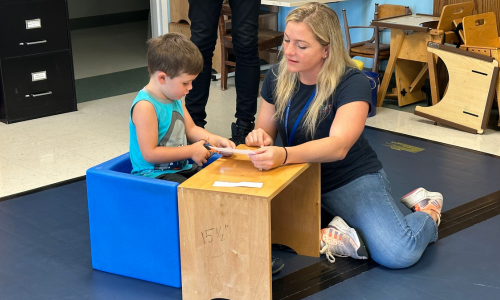
During OT treatment, it was determined that Kolton had retained reflexes requiring reflex integration therapy. Reflex integration is the process through which primitive reflexes that are present in infants gradually diminish and are replaced by more controlled, purposeful movements as a child’s central nervous system matures. Kolton’s retained reflexes impacted his body awareness, bilateral coordination, fine motor, and his hand-eye coordination.
When Kolton began therapy, he had a very strong ‘infantile’ grip on writing and drawing utensils, and while he could write his own name, he had almost no interest in writing or doing any sort of arts and crafts. Bianca began working with him right away on learning how to hold his markers and crayons in a tripod hold with the correct amount of pressure when tracing images and coloring in between the lines. “It was especially helpful that Bianca played to his interests of trucks, trains, and other vehicles when coming up with new therapy games and crafts to do because it kept him engaged and made him want to do the work.” says mom, Sam. Now Kolton is a pro at the tripod hold and loves showing off what he works on in preschool every day. He doesn’t even mind practicing his fine motor skills at home anymore. Kolton also generalized his fine motor skill development to holding/using feeding utensils like a fork and spoon with an appropriate grip to self-feed during mealtimes. Kolton competed against Bianca picking up cheerios with a fork in sessions to improve this skill.

During their therapy sessions, Bianca noticed that Kolton was seeking heavy work and movement to help him process his sensory integration and began working those techniques into his therapy plan. To work on his hand-eye coordination skills and improve his bilateral coordination, Bianca worked with Kolton on midline crossing activities such as jumping jacks and cross crawls. These exercises helped Kolton learn how to move both sides of his body at the same time and allowed him to practice those skills while getting to move around. Since these activities don’t require any additional equipment, they were also perfect to practice with his parents at home.
Kolton also took his sensory work home with him to practice, and mom Sam proudly shared that he has improved with sitting still so well that “We recently took Kolton to his first movie in the theater, and he was able to stay in the theater without getting up and moving around for the entire movie.” She explained that he had never even done that at home; so for his first successful movie experience to have been in a theater was especially thrilling. Not only that, but the struggle over his daily routines has greatly diminished, and he has even recently started to brush his teeth on his own. Sam attributes these successes to the sensory work he’s been doing in OT with Bianca.
According to Sam, one of the biggest benefits to Kolton’s therapy journey at the Schreiber Center though is that he is slowly moving towards more independence. She shares her pride in the fact that he has even learned how to be an advocate for himself and tell those around him when he needs help, and even more importantly how they can best help him. His mom attributes this to the absolute perfect fit that Bianca was for him. Looking back, she remembered that he used to be a shy kid, hiding behind her until he was comfortable, but he took to Bianca almost instantly and by his second session wasn’t even turning back to wave bye to her as he walked into the OT gym. “This self-confidence has spilled over to preschool where he now goes three times a week with no struggle” mom boasts.

At Kolton’s October assessment session to determine if he would require additional therapy, Bianca told mom “We’re still working on strengthening midline crossing, but he’s succeeded in all his other goals. We’re recommending one more care of treatment plan for an additional 13 weeks, but he will likely be ready to graduate in 6.” Now just nine months after beginning OT services with Bianca, Kolton has graduated. Watching him get his handprint on our walls at graduation was a bittersweet moment for everyone involved. Of course, we want all our kiddos to improve to the point that therapy is no longer needed, but we always miss them and hope that they’ll come back to visit even after their last appointment is complete.
Reflecting on Kolton’s therapy journey, Sam shares something that got her through the tough times was remembering that nothing gets better without putting in the work. Pediatric therapy is a journey filled with ups and downs, but the kids and parents who put in the work agree, the payoff is immense. Sam recommends to all parents who are thinking about pediatric therapies for their children “Do it! It is better to do the assessment and know for sure whether your child needs the extra help that pediatric therapy can provide to them, than to not know and wonder if there is something else you could be doing to help them. There is no need to struggle though when the assessment is simple, and the process of therapy at Schreiber is so fantastic. There is no shame in asking for and accepting help.”
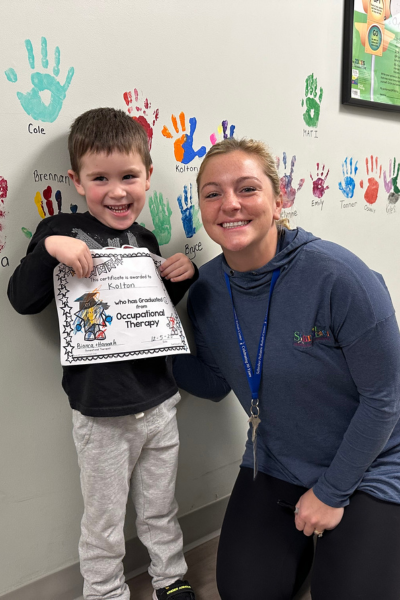
Help Schreiber Clients like Kolton receive the care they need, consider donating in support of our Kids’ Care Fund, a long and short term savings account used to cover the costs of uncompensated care.
As a nationally recognized pediatric facility, the Schreiber Center for Pediatric Development provides family-centered education and therapy programs for infants, children and adolescents with disabilities, developmental delays, and acquired injuries. Our goal-oriented approach maximizes each child’s ability to function independently within the community.
Join the Chairman’s Challenge and Become a Hero for Schreiber Kids
December 12, 2023When you enter Schreiber, you enter a world of possibility and hope filled with stories of resilience and triumph. Here, families navigate through challenges, therapists dedicate themselves to transformative work, and children, with unwavering determination, engage in therapy sessions with radiant smiles. These are the individuals we celebrate at Schreiber, and it’s their stories that propel us forward in our mission.
As the chair of the Where HEROES are Made capital campaign and a proud father of a Schreiber graduate, Jeff Bankert is leading an exciting new initiative – the Chairman’s Challenge.
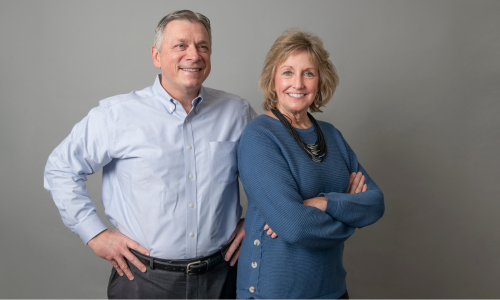
Having witnessed firsthand the transformative impact of Schreiber’s services on his own son, Jeff invites the community to join him in securing the future of the Kids’ Care Fund. This fund is more than just a financial initiative; it’s a promise to our community’s future generations. With your support, we can eliminate waiting lists and ensure that children, regardless of their family’s financial circumstances, receive the care they need.
On average, insurance and government assistance fall short on reimbursements by $74 per therapy session, resulting in a staggering $2.7 million in unmet costs for the Schreiber Center in fiscal year 2022. The Kids’ Care Fund addresses this gap, ensuring that families, like the Schaefer’s, whose children attend Schreiber for multiple therapies, are not burdened by the financial strain. Your contribution to the Kids’ Care Fund is an investment in the well-being of children like Katelyn and Kalvin, and it will help us carry forward the legacy of care initiated by our founder, Edna Schreiber, 87 years ago.
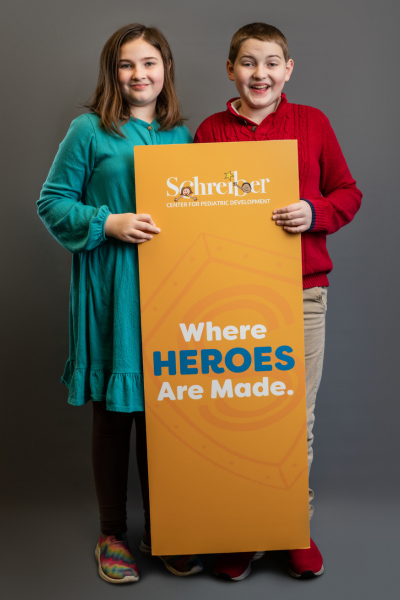
“They give a lot…beyond what they’re supposed too, and we appreciate it.”
– Kevin Schaefer, dad of Katelyn and Kalvin
Participating in the Chairman’s Challenge and donating to the Kids’ Care Fund is easy and rewarding. The Schreiber Center welcomes gifts in various forms, from immediate cash donations to multi-year pledges and transfers of assets like stocks, life insurance, or qualified charitable distributions. All contributions of $10,000 or more will be recognized on our ‘Schreiber Heroes’ wall, located inside our new pavilion. For gifts of $25,000 or more, you have the opportunity to name a space within our facility, leaving a lasting mark on Schreiber’s legacy.
Jeff Bankert and his family have pledged $25,000 to match all gifts received between now and the end of 2023. By participating in the challenge, you’re not just making a financial contribution – you’re investing in the well-being and future of Schreiber kids and their families.
Visit www.schreiberpediatric.org/where-heroes-are-made-campaign to make your contribution today and be a part of this incredible initiative.
As a nationally recognized pediatric facility, the Schreiber Center for Pediatric Development provides family-centered education and therapy programs for infants, children and adolescents with disabilities, developmental delays, and acquired injuries. Our goal-oriented approach maximizes each child’s ability to function independently within the community.
Empowering Avery: The Impact of Early Intervention Speech Therapy
November 28, 2023Born at a mere 29 weeks, Avery Berry spent the initial 57 days of her life at the Neonatal Intensive Care Unit (NICU) at Women’s and Babies, where Children’s Hospital of Philadelphia (CHOP) doctors, nurses, and her family rallied around her until she was strong enough to go home.
For her first two years her parents enveloped her in a world of language, speaking, singing, and reading to her. Despite cooing and babbling back, at two years old, Avery still showed no sign of language development. Concerned but undeterred, her parents and physicians explored Early Intervention speech therapy options for her.
Avery’s mom, Angie, believes that their NICU experience with CHOP doctors contributed to their swift acceptance into Early Intervention services. Once accepted, they chose to pursue therapy at the Schreiber Center for Pediatric Development.
Avery’s first year of speech therapy took place within the familiar confines of her own home three times a week, under the guidance of her therapist, Cassie. Her family’s primary goal was simple: to help Avery find words. While her parents diligently worked on baby sign language to bridge the language gap, their ultimate hope was to witness her communicate with the world.

Angie reminisces, “While she wasn’t necessarily shy, she struggled to connect with kids her age due to her communication limitations.” But through play-based therapies with Cassie and consistent practice with her parents, Avery embarked on her journey to building her language skills. Cassie’s creative and ever-changing repertoire of toys and games kept Avery engaged and excited during each session.
And then, one day, it happened. Avery uttered her first word – “Moo”. Both Angie and Cassie couldn’t help but shed tears of joy. Avery, who had once been unable to form words, had taken her first monumental step. Shortly after, she astounded them by saying ‘meow,’ a challenging word for any young speaker, let alone someone who had just begun their speech therapy journey.
Between therapy sessions Avery’s parents worked with her on every technique that Cassie modeled for them. One of the things that Angie believes helped Avery most was a technique called Visual Biofeedback, or mirror-play. Everyday Angie and Avery would stand in front of a mirror in their home and talk to each other. This allowed Avery to become more aware of her own facial expressions and speech sound productions, and eventually led to her gaining more voluntary control of her facial and oral structures.
Angie reflects, “Avery never became frustrated or angry about her inability to articulate her needs because she received the time and attention she needed, along with the support of her therapists and us.”

Once she aged out of Early Intervention, Avery started to attend Schreiber Center for speech therapy and began working with Becca, who she sees weekly. She is also enrolled in our S.T.A.R.S. Preschool and loves her teachers Mr. Jay and Ms. Michele. Angie proudly boasts “After two years of speech therapy at Schreiber Avery’s self-confidence with social interactions has sky rocketed. Now that she can speak and communicate effectively her confidence has soared, she’s made a ton of friends in preschool, and is comfortable expressing herself.”
When Avery isn’t in speech therapy or preschool, she and her mom love going to the park to play, taking little shopping trips to Target, and going to the library to check out new books to read together. At only four years old, Avery has become quite a little bookworm, and while her parents still read to her often, she loves being able to read to them too.
She and dad love playing outside, taking walks, and working on projects. She wants to be a hands-on helper for all projects in and out of the house. Her parents say they wouldn’t be surprised if Avery grew up to become an engineer because of her curiosity about how things are made and how they work. To encourage her creativity and curiosity every few months she gets a ‘Discovery Kit’ in the mail that includes a craft or project that she and her dad work on together.

One lesson that Angie learned through Avery’s therapy journey is that “Comparison is the thief of joy” so while she is incredibly proud of Avery’s reading skills and ingenuity, she also understands firsthand how difficult it is to watch other children develop on a different timeline than your own. “We tell Avery all the time that she is right on time with her own journey.” Angie shares. Which we think is a perfect reminder for us all, not to compare ourselves or our children to anyone else.
It’s difficult for parents and families who aren’t going through pediatric therapy services for their children to understand what it’s like, but Avery’s parents found community at the Schreiber Center through Schreiber’s hosted events and by bonding with other families in the waiting room. Angie advises any parent who is considering pediatric therapy for their own children to “Do it! The earlier the better and don’t compare your journey, or your child’s progress against anyone else.”

Help Schreiber Clients like Avery receive the care they need, consider donating in support of our Kids’ Care Fund, a long and short term savings account used to cover the costs of uncompensated care.
As a nationally recognized pediatric facility, the Schreiber Center for Pediatric Development provides family-centered education and therapy programs for infants, children and adolescents with disabilities, developmental delays, and acquired injuries. Our goal-oriented approach maximizes each child’s ability to function independently within the community.
Brookfield’s Safe Harbor Team Steps Up for Schreiber Center
November 20, 2023Brookfield Renewables hosted their company-wide step competition, a fantastic initiative promoting healthy exercise habits while raising funds for charity again this summer and a team from Safe Harbor Dam right here in Lancaster, PA won second place! What makes this announcement even more special is that they’ve chosen the Schreiber Center for Pediatric Development as the lucky recipient of their hard-earned winnings totaling $2,500!
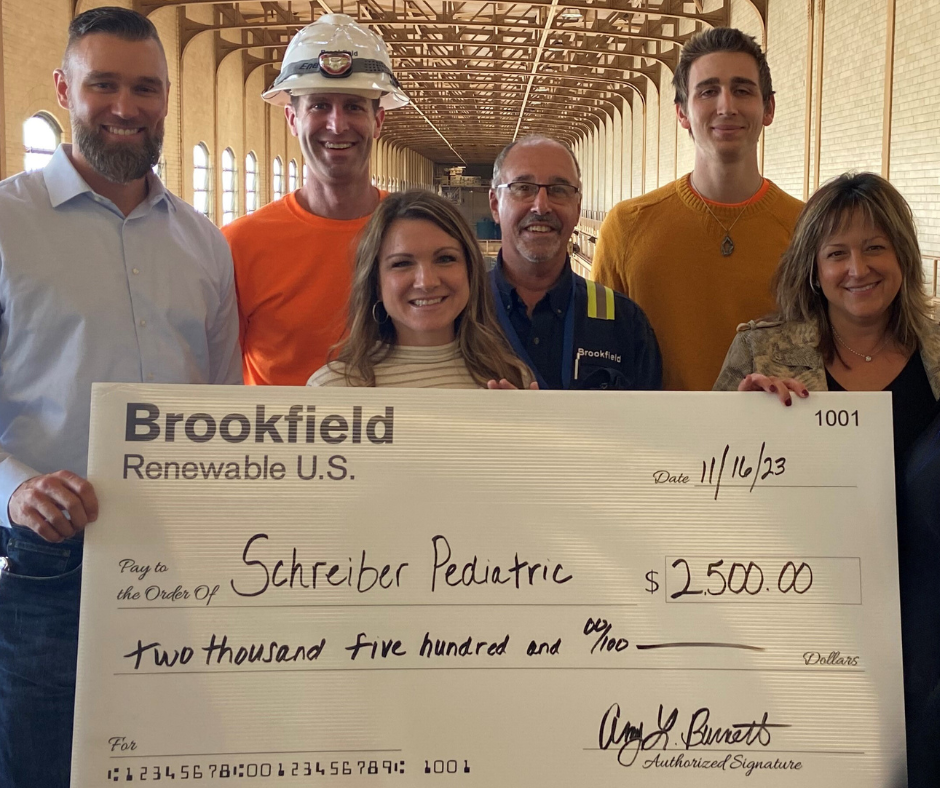
We want to extend our deepest thanks to the incredible individuals who made this possible, the champions of wellness from the winning Safe Harbor Dam team. A special shout-out goes to Dustin Droege, Keith Heisey, Mike Denlinger, Max Minnick, Alicia Blankenmeyer, Jon Kuzma, Tyler Reifsnyder, Brittney Orwick, and Dylan Steinfelt. Your dedication to getting those steps in were instrumental in securing the funds that will directly impact the lives of the children we serve.
Dustin, Keith, Mike, Max, Alicia, Jon, Tyler, Brittney, and Dylan, your efforts have not gone unnoticed. Each step you took in the competition was a step towards creating positive change for local children in need. Your enthusiasm for both wellness and philanthropy is inspiring, and we are profoundly grateful for your role in helping us provide therapy services to even more Central Pa kids. Your generosity is a beacon of hope for the children and families we support, and we’re honored to have you as partners in our mission.
We’re already looking forward to cheering you on in next year’s competition! The prospect of being selected once more as the beneficiary of the funds raised in the 2024 company-wide competition is truly an honor we’d cherish. Your continued support touches our hearts and helps create an even brighter future for the children we’re privileged to serve.
Donate today to join Safe Harbor in helping Schreiber clients continue to receive the care they need.
As a nationally recognized pediatric facility, the Schreiber Center for Pediatric Development provides family-centered education and therapy programs for infants, children and adolescents with disabilities, developmental delays, and acquired injuries. Our goal-oriented approach maximizes each child’s ability to function independently within the community.
Schreiber’s Commitment to Children’s Healthcare
November 20, 2023World Children’s Day is a time to reflect on the challenges that children face and to highlight the initiatives that are making a positive impact on their lives. This year, we’d like to draw your attention to the critical issues surrounding children’s healthcare and the efforts we’re making here at the Schreiber Center for Pediatric Development to address these challenges.
Access Disparities
One of the most pressing issues in children’s healthcare is the glaring disparities in access to medical services. Many children in underprivileged communities continue to lack proper healthcare due to financial, geographical, and cultural barriers. We recognize this inequality and have made great strides to help bridge this gap in central Pennsylvania.
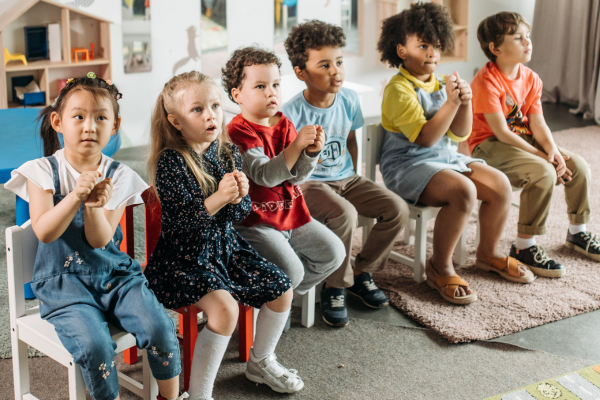
We provide comprehensive pediatric care services and affordable healthcare options. As one of the only pediatric therapy centers in the area to accept Medicaid insurance as a payment option we service many children who otherwise would not receive the pediatric therapy services they need. Our ‘Kids’ Care Fund’ ensures that every child that comes to our center for therapy receives the care they need, regardless of their family’s financial situation.
Childhood Disabilities
Children with disabilities require specialized care and support to thrive and reach their full potential. One size does not fit all when it comes to healthcare for children. Which is why we offer a range of therapy services, including mental and behavioral health, physical, occupational, and speech therapy, each tailored to the unique needs of the individual child.
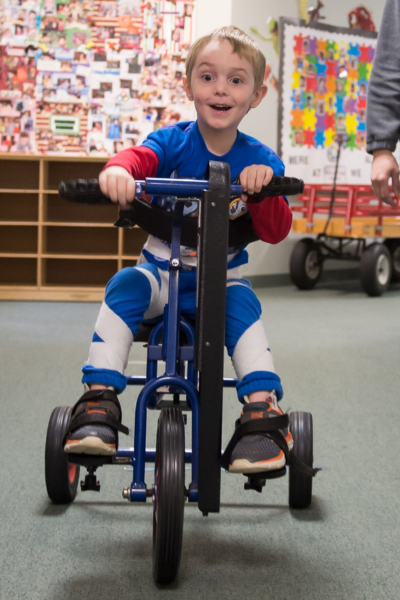
Through these programs, our Schreiber kids are provided with the tools they need to overcome the challenges they face, enabling them to flourish in their own way.
Pediatric Mental Health
The increasing mental health challenges in children are a mounting concern for parents, with far-reaching implications for the community. To help address this issue, we have integrated a new mental and behavioral health therapy department into our holistic approach to pediatric care that focuses on play-based and cognitive-behavioral therapies.
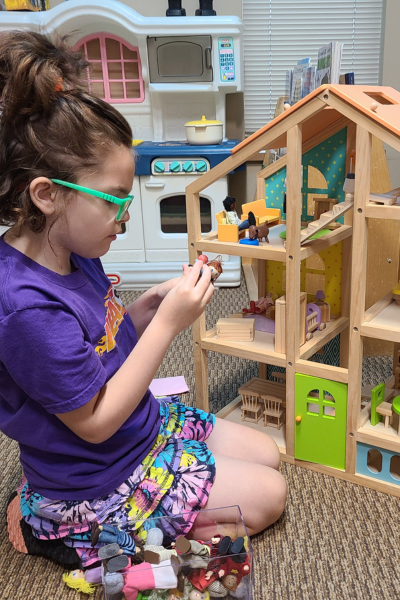
Our pediatric therapists specialize in diagnoses such as attention deficit hyperactivity disorder, autism spectrum disorders, depression, stress, anxiety, trauma related disorders, adoption, divorce, abuse, grief, and more. By providing counseling, emotional support, and resources, it is our goal to contribute to the emotional well-being of both children and their families and is an essential part of our commitment to the overall health and happiness of the children we serve.
Inclusive Education for Kids
The link between education and health is undeniable, yet many children face health issues that hinder their ability to access quality education, creating a cycle of disadvantage. Our S.T.A.R.S. Preschool is dedicated to reverse mainstreaming and has expanded our program that was once exclusively designed for children with special needs to include children of all abilities.
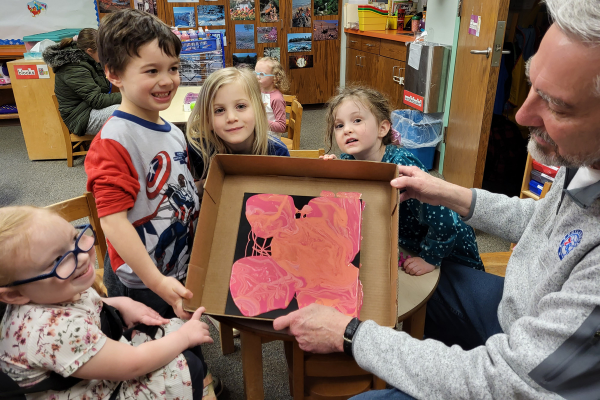
It is our hope that by playing together, our kiddos learn to not only understand and accept diversity, but to also value it. We also collaborate with the IU13 program to ensure that children with disabilities have equal access to quality education and are receiving any additional help they need. It is important to us that every child has the opportunity to learn and grow, regardless of their physical or mental challenges.
Support for Special Needs Children
We are proud to serve children with special needs and ensure that they receive the care and attention they require to thrive. We never hesitate to go the extra mile in providing resources and support for children with complex medical needs and chronic conditions. This includes assistance with obtaining medical equipment, specialized care, and respite services. We believe that by providing these services and support to our Schreiber families, children with special needs can lead fulfilling lives, and their families can find solace in knowing that their child’s unique requirements are met with compassion and expertise.
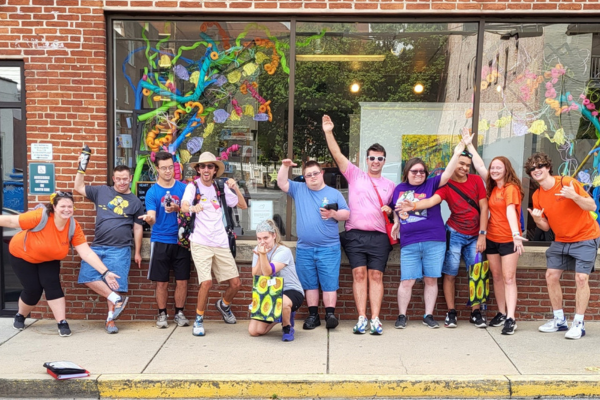
On World Children’s Day, we strive to be a beacon of hope and support, addressing the multifaceted challenges that children’s healthcare faces. Through our commitment to accessible, compassionate, and comprehensive care, we are working to improve the lives of children and their families, helping them overcome obstacles and reach their full potential. When every child receives the healthcare, support, and opportunities they deserve our purpose will be fulfilled.
To help us continue to provide necessary therapies to our Schreiber kids, consider donating to our Kids’ Care Fund to support our uncompensated care costs.
As a nationally recognized pediatric facility, the Schreiber Center for Pediatric Development provides family-centered education and therapy programs for infants, children and adolescents with disabilities, developmental delays, and acquired injuries. Our goal-oriented approach maximizes each child’s ability to function independently within the community.
ExtraGive Funds Pediatric Therapy at Schreiber
October 31, 2023Every child deserves the opportunity to lead a healthy and fulfilling life. At the Schreiber Center for Pediatric Development, we are committed to ensuring that every child, regardless of their abilities or financial circumstances, has access to the quality care they need.

The ExtraGive event (https://www.extragive.org/) is a remarkable opportunity for us to come together as a community and make a significant impact on the lives of children who rely on our pediatric therapy programs. Your generous donations during the ExtraGive event will directly benefit our occupational, physical, speech, and mental and behavioral health therapy programs, as well as our “Kids’ Care Fund” designed to cover uncompensated care expenses.
Pediatric Occupational Therapy: Feeding Program
Pediatric occupational therapy is a crucial component of the services we provide at Schreiber Center for Pediatric Development. Many children face challenges related to feeding and nutrition, and our goal is to support them in developing the necessary skills for a healthy diet. Your donations will help us establish a new feeding program that will provide personalized support to children with various feeding difficulties.
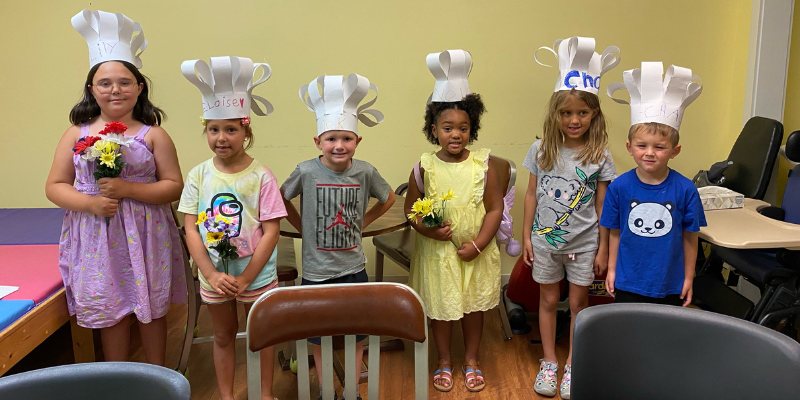
Feeding issues can be a source of tremendous stress for families, and your contributions will make it possible for us to offer specialized therapy, equipment, and resources to help these children develop the skills they need to thrive.
Pediatric Physical Therapy: Medical Mobility Equipment

Children with mobility impairments often require specialized equipment to enhance their mobility and independence. The funds donated during the ExtraGive event will be instrumental in acquiring essential medical mobility equipment for our pediatric physical therapy program.
These devices can be life-changing for children, enabling them to participate in everyday activities and improving their overall quality of life. Your support will help us ensure that no child in central PA is left without the necessary equipment to navigate the world around them.
Pediatric Speech Therapy: Communication Devices
Communication is a fundamental aspect of a child’s development, and for some children, it can be particularly challenging. Our pediatric speech therapy program is dedicated to helping children develop their communication skills, and your donations will play a pivotal role in achieving this goal.
We aim to provide augmentative and alternative communication (AAC) devices, speech-generating devices (SGDs), and other assistive communication tools to children who need them. These devices empower children to express themselves, connect with others, and engage with the world in meaningful ways.

Mental and Behavioral Health Therapy: After-School Social Programs
At Schreiber Center for Pediatric Development, we recognize the importance of mental and behavioral health in a child’s overall well-being. Your donations will support our after-school social programs, including the popular “After-School Lego Club,” designed specifically for children with autism.
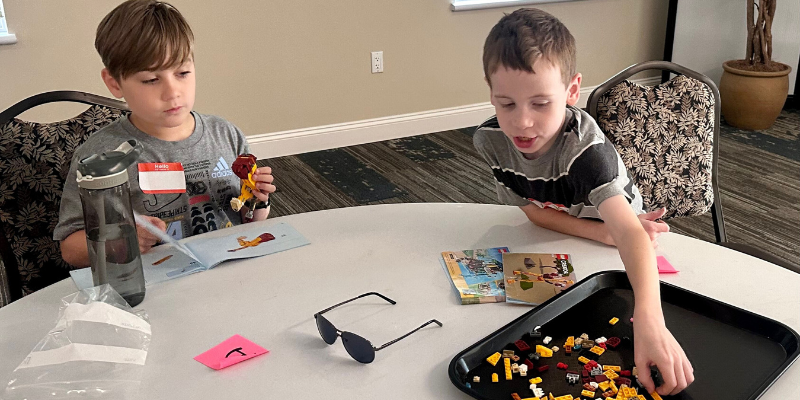
These programs offer a safe and supportive environment where children can develop social skills, build friendships, and gain confidence. Your contributions will enable us to expand these programs, reaching even more children who can benefit from them.
The “Kids’ Care Fund”: Ensuring Access to Care for All
In addition to directly supporting our therapy programs, your generous donations during the ExtraGive event will be added to our “Kids’ Care Fund.” This fund serves as a safety net, ensuring that all disabled children receive the care they need, regardless of their families’ financial circumstances.
The “Kids’ Care Fund” is a savings account that bridges the gap between what private insurance and Medicaid supplements cover and the actual cost of care. At Schreiber Pediatric, we have always made the promise that no child will be turned away, and your contributions help us fulfill this commitment.

Your support during the ExtraGive event will have a profound and lasting impact on the lives of the children we serve through our pediatric therapy programs at Schreiber Center for Pediatric Development. Whether it’s helping a child improve their feeding skills, providing essential mobility equipment, enabling communication, or fostering social connections, your generosity makes it all possible.
Furthermore, your donations will contribute to the “Kids’ Care Fund,” ensuring that no child is denied the care they deserve due to financial constraints. Together, we can make a difference in the lives of Schreiber kids and their families, offering hope, support, and a brighter future. Join us in transforming lives and creating a more inclusive and compassionate community for all children in central PA. Donate during the ExtraGive event and be a part of something truly extraordinary.
Go Big or Go Home: Javion Rodriguez
October 25, 2023“Go Big or Go Home” says Schreiber client, Javion Rodriguez, who went big this summer when he played in the Little League World Series Challenger Series. For 30 years this series for kids and teens with physical or mental disabilities has invited the best teams in the world to compete, and for the very first time a local team from Lancaster, PA received the invitation.

As one of the older members of the Lancaster PA team Javion says he feels like a role model and leader amongst the team and takes his position seriously. There is part of him that can’t wait to play in the senior league and really show the world what he’s capable of though. When asked what his favorite part of the game was, he had a difficult time choosing his time at shortstop or batting. He settled on the excitement of batting when he recalled his favorite part of the LLWS game was when he was walking to the plate for his at bat and received a standing ovation from the crowd.

In the off season, Javion works on his fielding skills and hitting off a T in his yard at home. During his physical therapy sessions here at Schreiber he prefers to work on specific exercises that will help strengthen the muscles needed to improve his game. Strengthening his core and improving his stance and swing are his personal physical therapy goals right now. Under instruction and supervision of his therapists here at Schreiber, Javion uses weights during rotation exercises designed to strengthen his obliques and performs a modified foam roller plank to strengthen his arms, legs, and core all while working on improving his coordination.

His passion for all things sports has helped him secure his current job as a sports analyst, interviewing and reporting on players, writing articles, and even doing a bit of marketing for a local ‘backyard’ baseball league. Currently a Freshman at McCaskey with straight A’s and an interest in math, Javion plans to graduate high school, go to college and play baseball in the Challenger League for as long as he remains a student. We have no doubt Javion Rodriguez will always “Go Big”!

To help Schreiber Clients like Javion continue to receive the care they need, consider donating in support of our uncompensated care fund.
As a nationally recognized pediatric facility, the Schreiber Center for Pediatric Development provides family-centered education and therapy programs for infants, children and adolescents with disabilities, developmental delays, and acquired injuries. Our goal-oriented approach maximizes each child’s ability to function independently within the community.
Down Syndrome Awareness Month
October 16, 2023This month we have the opportunity to raise public awareness about the condition Down Syndrome, as we advocate for the inclusion and acceptance of people with Down Syndrome. It is an unfortunate fact that people with Down Syndrome continue to face stereotypes and misconceptions about their abilities. We urge you to take this month to learn more about this condition and help us to spread the message of acceptance and respect for all people with Down Syndrome all year round.
What is Down Syndrome?
Down Syndrome is a genetic condition that occurs when a person is born with an extra chromosome. People are typically born with 46 chromosomes, but a person with Down Syndrome has an extra copy or part of an extra copy or chromosome 21.
There are three different types of Down Syndrome, and they are all dependent on how the extra chromosome 21 presents within the diagnosed person.
The most common type of Down Syndrome is called Trisomy 21, and about 95% of people who are diagnosed with Down Syndrome are diagnosed with this type. Trisomy 21 means that each cell within the body has three copies of chromosome 21 instead of the usual two copies.
The second most common type of Down Syndrome is called Translocation Down Syndrome and only about 3% of people diagnosed with Down Syndrome have this type. Translocation Down Syndrome occurs when an extra part or a whole extra chromosome 21 is present but attached ‘trans-located’ to a different chromosome, rather than being separate as is the case of Trisomy 21.
The least common type of Down Syndrome is called Mosaic Down Syndrome and only 2% of people who are diagnosed with Down Syndrome have this type. Mosaic Down Syndrome means that some of the cells in the body have three copies of chromosome 21, but other cells in the body still only have the typical two copies. Because only some of the cells in the body contain this additional chromosome this type of Down Syndrome presents less dominantly in physical features than the other two.
How do I know if my child has Down Syndrome?
About 6,000 babies are born with Down Syndrome in the US every year: that’s about 1 in every 700 babies. Down Syndrome can be detected in utero with screening tests and/or diagnostic tests. Screening tests can tell you if your pregnancy has a higher or lower chance of resulting in a baby with Down Syndrome, but they do not provide an absolute diagnosis. Diagnostic tests on the other hand, can typically detect whether a baby will have Down Syndrome. Diagnostic tests can be risky and are not generally performed until after a positive screening test. They include Chorionic villus sampling (CVS) which examines the material from the placenta, Amniocentesis which examines the amniotic fluid, and Percutaneous umbilical blood sampling (PUBS) which examines the blood from the umbilical cord. Each of these tests look for changes in the chromosomes that would indicate a Down Syndrome diagnosis.
What causes Down Syndrome?
Researchers know that Down Syndrome occurs when a person is born with an extra chromosome 21, but they are unsure how or why the extra chromosome forms. Many researchers believe that there are several different factors that play a role in whether the extra chromosome 21 will form in utero, but they are not entirely sure what those factors are. It is known that the likelihood of a baby being born with Down Syndrome increases with a mother’s age, but because more women give birth before they turn 35, more babies with Down Syndrome are born to women under 35 years of age. Nothing that a parent does during pregnancy is known to cause Down Syndrome.
What are the complications of Down Syndrome?
About half of people with Down Syndrome also have a congenital heart defect. They are also more prone to hearing loss, ear infections, obstructive sleep apnea, respiratory issues, eye diseases, poor eyesight, Alzhemer’s disease, leukemia, thyroid disorders and intestinal blockages at birth that require surgery.
In addition to the physical complications that can come along with Down Syndrome, it can also cause intellectual and developmental symptoms that can lead to cognitive impairment. Similar to the physical complications these symptoms can range from mild to moderate and include short attention span, poor judgement, impulsive behavior, slow learning, and delayed language and speech development.
What is the treatment for Down Syndrome?
Making sure that a child with Down Syndrome receives services early in life will help them to improve their physical and intellectual abilities and ensure that they reach their full potential into adulthood. Most of the services recommended for children with Down Syndrome focus specifically on helping them minimize the effects of any intellectual or developmental symptoms the condition is responsible for. Early intervention services include speech therapy, occupational therapy, and physical therapy.
These therapies can be beneficial to children with Down Syndrome past the years of early intervention as well. Each person with Down Syndrome has different talents, and they all have the ability to thrive. Down Syndrome is a lifelong condition and children with Down Syndrome may need extra help or attention in school, but with the proper treatment plan and early intervention many people with Down Syndrome are able to be mainstreamed and attend regular classes with their peers.
If you child has been diagnosed with Down Syndrome and you are interested in learning more about how Schreiber’s Pediatric Therapies can help your child visit: http://www.schreiberpediatric.org/therapy-services/
As a nationally recognized pediatric facility, the Schreiber Center for Pediatric Development provides family-centered education and therapy programs for infants, children and adolescents with disabilities, developmental delays, and acquired injuries. Our goal-oriented approach maximizes each child’s ability to function independently within the community.
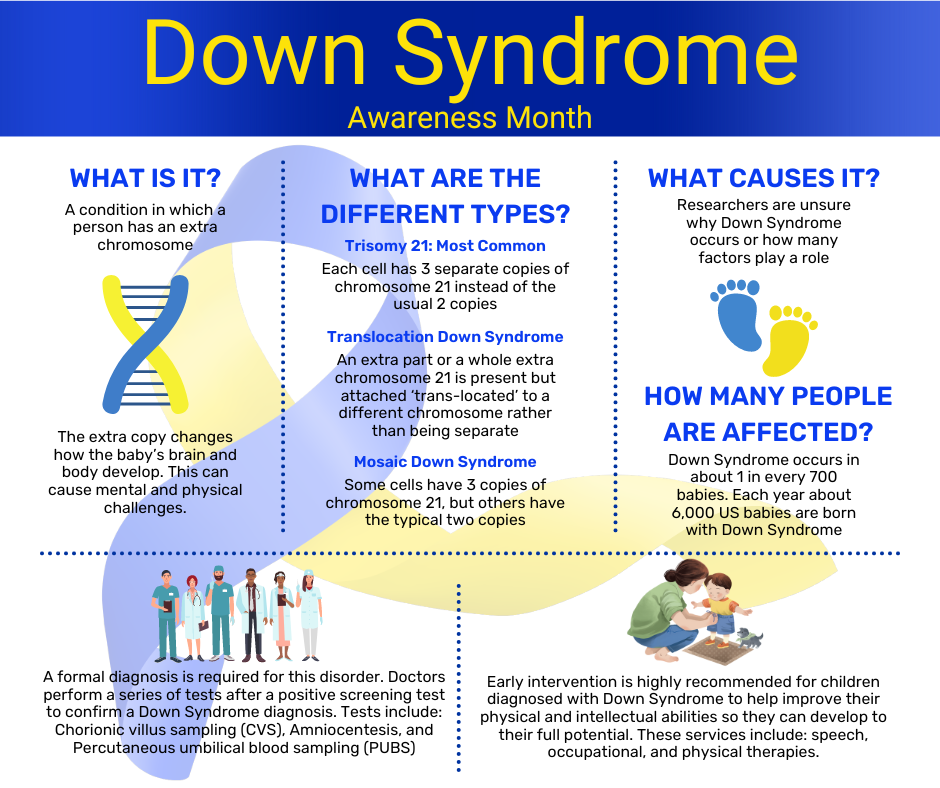
20 Tips for a Sensory Processing Disorder Friendly Halloween
October 12, 2023Halloween, with its costumes, candies, and eerie decorations, is a thrilling time for many children. However, for those with Sensory Processing Disorder (SPD), this holiday can present unique challenges. SPD can make the sensory overload of Halloween overwhelming. But fear not! In this blog post, we’ll share some invaluable sensory Halloween tips and ideas to ensure your child has a comfortable and enjoyable Halloween experience.
1. Prepare Your Child:
Start by preparing your child for Halloween. Explain the concept of the holiday and what to expect. Videos can be a great tool to help them visualize what Halloween is all about.
2. Visual Calendar:
Create a visual calendar to help your child countdown to Halloween. Seeing the days pass can provide a sense of predictability and reduce anxiety.
3. Pumpkin Alternatives:
Many children with SPD don’t enjoy carving pumpkins. Encourage them to paint or draw on them instead.

4. Comfortable Costumes:
Choose costumes that are comfortable and not overly frightening. Let your child have a say in picking their costume to ensure it aligns with their sensory preferences.
5. Less Is Best:
Remember, when it comes to costumes, less is often best. Avoid bulky or restrictive outfits that can cause discomfort.
6. Familiar Clothing:
Consider creating costumes from familiar clothing items. This can help your child feel more at ease in their costume.

7. Gradual Costume Familiarization:
Practice wearing the costume for short intervals, starting with just a few minutes and gradually working up to longer periods.
8. Show Costume Varieties:
Show your child pictures of different costumes they may encounter while trick-or-treating. Familiarity can ease anxiety.
9. Avoid Masks:
Most children with SPD don’t like masks. Opt for face paint or makeup instead, which can be less restrictive. Costumes that don’t need a mask, face paint, or makeup may be the best option for some children.
10. Walk the Route:
Before Halloween night, walk the trick-or-treat route a few times with your child to make it familiar and less intimidating.
11. The Joy of Giving:
Remind your child that Halloween isn’t just about receiving treats. Encourage them to be the one who hands out candies to neighbors, which can be a rewarding experience.
12. Early Trick-or-Treating:
Consider going trick-or-treating earlier in the evening, before it gets dark and potentially spookier.
13. Bring a Friend:
Having a friend along can provide extra support and companionship for your child.

14. Respect Their Limits:
If your child becomes tired or no longer wants to participate, don’t push them to continue. Respect their limits and end the evening.
15. Avoid Crowds:
Try to avoid crowded areas and houses while trick-or-treating to reduce sensory overload.
16. Sensory Gear:
Bring noise reduction headphones and sunglasses if your child is sensitive to loud noises or bright lights.
17. Maintain Routine:
Stick to your child’s regular bedtime routine to provide a sense of stability on Halloween night.
18. Sensory Diet:
Complete a sensory diet before and after trick-or-treating, incorporating activities like brushing, joint compressions, heavy work, swinging, or trampolining.
19. Fine Motor Skills:
Have your child attempt to open candy wrappers themselves, which can help improve fine motor skills.
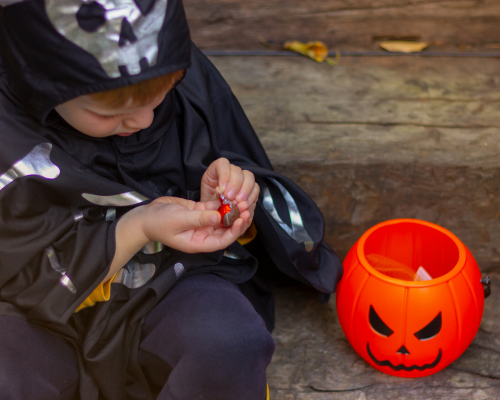
20. It’s Okay Not to Go Out:
Lastly, remember that if your child doesn’t want to go out for Halloween, that’s perfectly okay. Their comfort and well-being should always come first.
Halloween can be a magical time for children, and with these sensory Halloween tips and ideas, you can help your child with SPD enjoy the festivities while minimizing stress and sensory challenges. By being understanding, patient, and supportive, you can create a Halloween experience tailored to your child’s unique needs and preferences.
If you child has been diagnosed with Limb Girdle Muscular Dystrophy and you are interested in learning more about how Schreiber’s Pediatric Therapies can help your child visit: http://www.schreiberpediatric.org/therapy-services/
As a nationally recognized pediatric facility, the Schreiber Center for Pediatric Development provides family-centered education and therapy programs for infants, children and adolescents with disabilities, developmental delays, and acquired injuries. Our goal-oriented approach maximizes each child’s ability to function independently within the community.
Limb Girdle Muscular Dystrophy
September 29, 2023What is Limb Girdle Muscular Dystrophy?
Limb Girdle Muscular Dystrophy is a group of muscular dystrophies which can be inherited in various ways. It equally effects males and females and symptoms begin between 8 and 15 years of age. About 2 to 10 out of 100,000 people are affected by this muscle disorder which leads to muscle weakness and muscle wasting of varying severity. Most commonly the shoulder and pelvis muscles are affected and as it progresses the hips, shoulders, arms, legs, and back muscles all weaken. The symptoms are known to progress slowly and while there is no cure the life expectancy of an individual with this diagnosis is generally within a normal range since the heart and breathing muscles are not affected.
How do I know if my child has Limb Girdle Muscular Dystrophy?
The signs and symptoms of people with Limb Girdle Muscular Dystrophy can vary widely. Even among individuals within the same family there is a good chance that the signs and symptoms will not be the same. Since symptoms can begin at any age, it’s important to keep an eye out for these common signs throughout your child’s life:
- Inability to rise from a squatting position without using the arms for leverage
- Toe walking or walking on the balls of their feet
- A waddling gait when walking
- Difficulty running
- Joint stiffness
- Abnormal spine curvature (lordosis/scoliosis)
Because these signs and symptoms are common in other muscular dystrophies, it is critical to see a medical doctor and receive a formal diagnosis so that proper treatment can be obtained. The formal diagnosis is based on symptoms, symptom severity, age at which the symptoms began, and family medical history. Doctors will perform a series of tests including: electrodiagnostic tests, laboratory tests, muscle biopsies, imaging studies, electrocardiograms, and genetic testing to confirm their diagnosis.
What Causes Limb Girdle Muscular Dystrophy?
Limb Girdle Muscular Dystrophy is a neuromuscular genetic disorder that occurs when a faulty gene results in abnormal muscle function. Many genes have been identified as contributing to this disorder so while it can be passed from parent to child, the child also could be the first in the family to have muscular dystrophy.
What are the complications of Limb Girdle Muscular Dystrophy?
While it is rare for Limb Girdle Muscular Dystrophy to affect the heart, lungs, digestive system, or other body systems outside of the muscles, it is possible. Any time the heart or lungs are affected by muscular disorders there is a chance that life expectancy will be negatively affected.
What is the treatment of Limb Girdle Muscular Dystrophy?
While there is no cure for Limb Girdle Muscular Dystrophy there are treatments for it. Treatments range from medications that are prescribed by medical professionals to help relieve symptoms relating to Limb Girdle Muscular Dystrophy to physical, respiratory, occupational, and behavioral therapies to help reduce the process of muscle weakness and wasting. Treatment is individualized for each patient and designed to enhance quality of life.
If you child has been diagnosed with Limb Girdle Muscular Dystrophy and you are interested in learning more about how Schreiber’s Pediatric Therapies can help your child visit: http://www.schreiberpediatric.org/therapy-services/
As a nationally recognized pediatric facility, the Schreiber Center for Pediatric Development provides family-centered education and therapy programs for infants, children and adolescents with disabilities, developmental delays, and acquired injuries. Our goal-oriented approach maximizes each child’s ability to function independently within the community.
